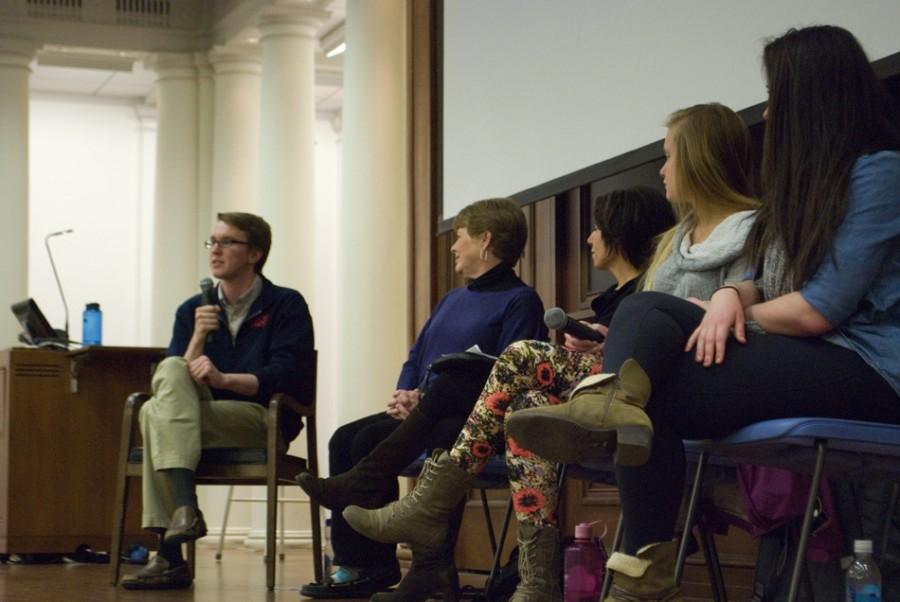Play-prompted panel discusses socioeconomic diversity at Northwestern
Caroline Olsen/The Daily Northwestern
Communication senior A.J. Roy, left, moderates a panel of Northwestern students, a professor and an administrator as they discuss socioeconomic inequality in college. The panel was hosted by NU’s Quest Scholars and the upcoming Arts Alliance production of “Good People.”
November 3, 2014
The Arts Alliance’s “Good People” and Northwestern Quest Scholars Network hosted a panel Sunday featuring student and administrative leaders to start a conversation about the spectrum of socioeconomic difference at NU.
The panel was organized to address the themes covered in the student play, Good People, which will run Nov. 13-15. The panelists included sociology Prof. Leslie McCall, director of sociology Undergraduate Studies, Communication junior Amanda Walsh, president of NU Quest Scholars, Carolyn Lindley, University director of Financial Aid, and Communication senior Aileen McGraw, creator of Project Wildcat’s Camper Financial Aid Fund. Good People director A.J. Roy, a Communication senior, moderated the discussion, which centered on the roles of people’s circumstances and the influence of hard work in determining success.
Lindley discussed the emphasis NU places on addressing the range of financial circumstances of its students. More than half of the undergraduate class receives scholarships to attend NU, Lindley said.
“We are encouraged that we can offer scholarship assistance to students but we are conscious of the fact of the students who still have to borrow money,” she said. “We want to make sure that we are concerned about their debt and watching as closely as we can.”
Walsh talked about how low-income students may often feel underrepresented and embarrassed being open about their economic situations. She said economic inequality can be most felt in terms of academic accessibility of textbooks and resources and of involvement in extracurricular activities and social interactions.
“There are discussions of things like a textbook fund or we have the student activities fee so that students have access to extracurricular activities,” Walsh said. “There’s still a lot of work to do in making sure people’s circumstances don’t dictate the entirety of their college experience.”
McGraw said a student’s socioeconomic situation should be taken into account when measuring the value of hard work. A lot of students have work-study jobs that dictate how busy they are and how many other activities they can take up.
McCall addressed the rising trend of socioeconomic inequality.
“We need to correct an impression that politicians, and we, have on the American public,” she said. “That impression is that it is only hard work that matters and there aren’t structural factors that are important in getting ahead. Then you can start thinking of the policies that would help enable people to actually get ahead based on hard work.”
After the event, Roy told The Daily he decided to organize the panel in advance of the play’s showing to try to spur discussion about the issues off the stage.
“We wanted to make sure that theater on campus doesn’t feel like a vacuum,” Roy said. “We’re not just majoring in the practice of making plays, but we’re spending more time having high-level conversation about what’s actually going on.”
Communication junior Emily Baldwin said after the event that she thinks the discussion about socioeconomic inequality on campus is important.
“The primary role of the student is to be more aware of what going on and not making assumptions about people who might be of different financial backgrounds,” Baldwin said. “It’s important to accept that luck is a huge factor in your experience and to move away from the idea that what you are able to pay for equates with friendship.”
Email: [email protected]
Twitter: @yeareeka












